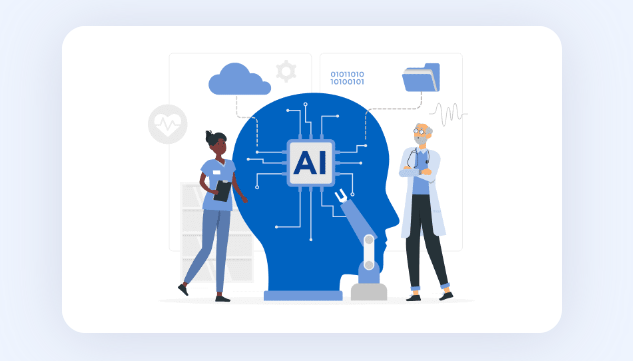Artificial Intelligence Use Cases in Healthcare: Revolutionizing Patient Care

Introduction
In the ever-evolving landscape of healthcare, artificial intelligence (AI) has emerged as a transformative force. This article delves into the myriad applications of AI in healthcare, exploring how it is reshaping patient care, diagnostics, and treatment strategies.
Leveraging AI for Diagnostic Precision
Artificial Intelligence Use Cases in Healthcare Diagnostics AI-driven diagnostic tools are spearheading a paradigm shift, providing unparalleled accuracy in identifying ailments. From early detection of diseases to precise interpretation of medical imaging, AI is enhancing diagnostic capabilities. This not only expedites treatment initiation but also improves overall patient outcomes.
Enhancing Treatment Strategies with AI
Revolutionizing Treatment Plans AI is not just limited to diagnostics; it plays a pivotal role in tailoring treatment plans. By analyzing vast datasets, AI can predict individual responses to medications, enabling personalized treatment strategies. This ushering in an era of precision medicine, where interventions are customized to the unique genetic makeup of each patient.
Personalized Medicine: A Game-Changer
AI in Personalized Medicine The integration of AI in healthcare extends to personalized medicine, where treatments are tailored to an individual's genetic predispositions. This approach not only optimizes therapeutic outcomes but also minimizes adverse effects, marking a significant advancement in patient-centric care.
Streamlining Administrative Tasks with AI
AI-Driven Administrative Efficiency Beyond clinical applications, AI is streamlining administrative tasks, reducing operational burdens on healthcare providers. From appointment scheduling to billing processes, AI enhances efficiency, allowing medical professionals to focus more on patient care.
Bridging Gaps in Remote Patient Monitoring
Remote Patient Monitoring through AI In the era of telehealth, AI facilitates remote patient monitoring, offering real-time insights into vital signs and health metrics. This not only empowers patients in managing chronic conditions but also enables timely interventions, preventing complications.
AI in Healthcare: Addressing Resource Constraints
Optimizing Resource Allocation Artificial intelligence addresses resource constraints in healthcare settings. Through predictive analytics, AI aids in optimizing resource allocation, ensuring that healthcare facilities operate efficiently, even during peak demand periods.
Ensuring Cybersecurity in Healthcare AI
AI in Healthcare Security As the healthcare industry embraces AI, ensuring cybersecurity is paramount. AI is leveraged to fortify healthcare systems against cyber threats, safeguarding sensitive patient data and maintaining the integrity of medical records.
The Future of AI in Healthcare: Constant Innovation
Continuous Advancements in AI Healthcare Solutions The field of AI in healthcare is dynamic, with continuous innovations shaping the future. From robotics in surgery to AI-assisted drug discovery, the possibilities are limitless, promising groundbreaking advancements that will redefine the healthcare landscape.
Artificial Intelligence Use Cases in Healthcare
AI and Chronic Disease Management
Transforming Chronic Disease Management AI is revolutionizing chronic disease management by offering proactive monitoring and personalized intervention strategies. This empowers patients to actively engage in their health, leading to improved outcomes and a better quality of life.
FAQs
How is AI Improving Diagnostic Accuracy?
AI enhances diagnostic accuracy by analyzing vast datasets, identifying subtle patterns, and providing precise interpretations of medical imaging. This aids in early detection and improves overall patient outcomes.
Can AI Really Personalize Treatment Plans?
Absolutely. AI analyzes individual patient data, including genetic information, to predict responses to medications. This allows for the creation of personalized treatment plans, optimizing therapeutic outcomes.
What Role Does AI Play in Administrative Efficiency?
AI streamlines administrative tasks, from appointment scheduling to billing processes, reducing operational burdens on healthcare providers and enhancing overall efficiency.
Is AI in Healthcare Secure?
Yes, AI is utilized to fortify healthcare systems against cyber threats, ensuring the security and integrity of patient data and medical records.
How Does AI Facilitate Remote Patient Monitoring?
AI enables real-time monitoring of vital signs and health metrics, empowering patients in managing chronic conditions and facilitating timely interventions, even in remote settings.
What's the Future of AI in Healthcare?
The future holds continuous advancements, from robotics in surgery to AI-assisted drug discovery, promising groundbreaking innovations that will redefine healthcare practices.
Conclusion
The integration of artificial intelligence use cases in healthcare marks a transformative era in patient care. From diagnostics to treatment personalization, administrative efficiency, and beyond, AI is revolutionizing the healthcare landscape. Embracing these innovations ensures a future where healthcare is not only efficient but also personalized and patient-centric.
- Whats New
- Shopping
- Wellness
- Sports
- Theater
- Religion
- Party
- Networking
- Music
- Literature
- Art
- Health
- الألعاب
- Food
- Drinks
- Fitness
- Gardening
- Dance
- Causes
- Film
- Crafts
- Other/General
- Cricket
- Grooming
- Technology

